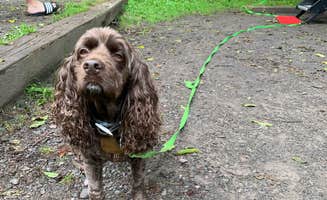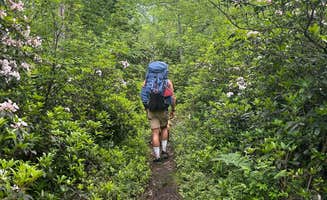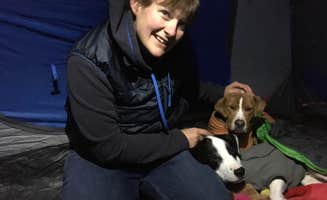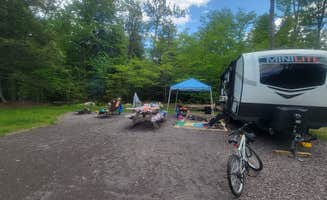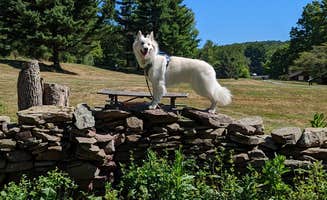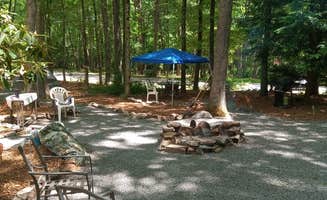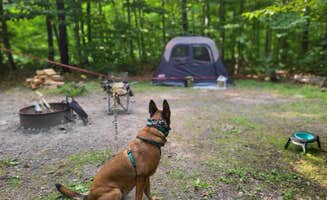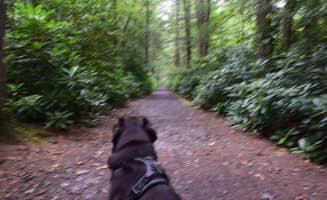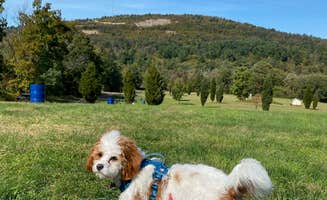Wilkes-Barre camping areas sit within northeastern Pennsylvania's anthracite coal region at approximately 550 feet elevation. The surrounding Pocono Mountains and valley terrain create distinct microclimates where summer temperatures typically range from 75-85°F during peak camping season. Campgrounds in this region offer diverse terrain from creek-side settings to forest clearings, with ticks being particularly prevalent from May through September.
What to do
Boulder field exploration: The Boulder Field at Hickory Run State Park Campground is a National Natural Landmark covering 16.5 acres of boulder-strewn terrain. "Boulders everywhere! Big ones, small ones, run (carefully) across them all! Beyond the Boulder field is a vast, scary, unknown," notes Mike M. The geological formation dates back to the last ice age.
Creek swimming access: Multiple campsites at Cozy Creek Family Campground offer direct water access for cooling off. "The tent sites are right on the creek. The grounds, the little store/coffee shop and the facilities were pristine," reports Louis P. The creek maintains refreshing temperatures even during summer heat.
Lake activities: Lake Jean at Ricketts Glen provides non-motorized boating options including kayaks and canoes. "There is a separate shore for kayaks and canoes to enter the lake. We even got to see an eagles' nest near our campsite," explains Marlaina M. Early mornings offer the calmest water conditions for paddling.
What campers like
Clean facilities: Cleanliness ranks high among camper priorities at Highland Campgrounds. "Office is clean and a combined country store with fresh produce in the outdoor fridge and bug spray and essentials in the office area," mentions Jennifer R. Most campgrounds maintain daily bathroom cleaning schedules.
Abundant wildlife viewing: The forests surrounding Lackawanna State Park Campground support diverse wildlife. "We saw deer daily. There are 3 resident geese who wander around near the creek and lakes," notes Becca U. Early morning and dusk provide optimal wildlife viewing opportunities.
Private camping spaces: Site layout and vegetation contribute to privacy levels. "The sites are large and many are somewhat private in terms of visual barriers," reports Bridget D. Campgrounds with mixed deciduous forest settings typically offer better site separation through natural vegetation.
What you should know
Bear precautions required: Black bears actively roam throughout the region, requiring proper food storage. "We were warned at check in that there have been a lot of bears in the area but never really thought that we would see one. As soon as we got to our site one came right up as we were setting up our tent," reports Erik M. Most campgrounds require all food to be secured in vehicles overnight.
Variable bathroom quality: Bathroom facilities range significantly between campgrounds and even within different camping loops. "Inner loops have nice bathrooms. We were in the outer loop far from the rest of the campground and they only had ports potties and hand sanitizer," explains Sarah L. about Hickory Run.
Limited cell service: Coverage varies dramatically between providers and locations. "Be advised that there was no cell service or internet for AT&T users. Verizon did have some service," shares Becca U. Most state parks have emergency phone access at ranger stations or entrance areas.
Tips for camping with families
Water recreation options: Tobyhanna State Park Campground offers swimming and water activities suitable for various ages. "The lake is very nice a little copper kind of like iced tea color but was very nice. They have a few hiking trails we didn't get to do, also have a horse shoe pit volleyball ball area and a little play area in the camping area," notes Erik M. Most swimming areas lack lifeguards, requiring parental supervision.
Playground availability: Several dog friendly campgrounds near Wilkes-Barre include play structures for children. "There is a large open field in the loop we camped in with a swing set on it. This was nice for families with children," reports Shirley M. Playground equipment tends to be basic rather than elaborate.
Education centers: Nature programs and interpretive activities enhance family camping experiences. "There is an environmental education center with programs, there is fishing and boating, and an amazing network of hiking and horse riding trails," explains Janet R. Most educational programming runs weekends during peak summer season.
Tips from RVers
Hookup considerations: Full-service RV sites at Moyers Grove Campground require specific equipment planning. "Make sure you have a LONG water hose. We actually had to buy a 50 foot hose in the camp store to accommodate the distance to the spigot," advises Becca U. Standard 25-foot water hoses may be insufficient at many area campgrounds.
Road conditions: Access roads to pet-friendly campgrounds around Wilkes-Barre vary in quality. "The road in (Vacation lane) is dirt, rough and narrow. There is presently no gate as well so the public can just drive in," reports April L. Many campground access roads become particularly challenging after heavy rainfall.
Site sizing: RV site dimensions and layouts vary significantly between campgrounds. "We had site 44 in the Stony Point loop and it was by far the largest campsite on the property. We had a thick covered wooded area to our right and a huge grassy area to the left. Was also an easy back in site," explains Jackie F. Most state parks accommodate RVs up to 40 feet, though site-specific limitations apply.


